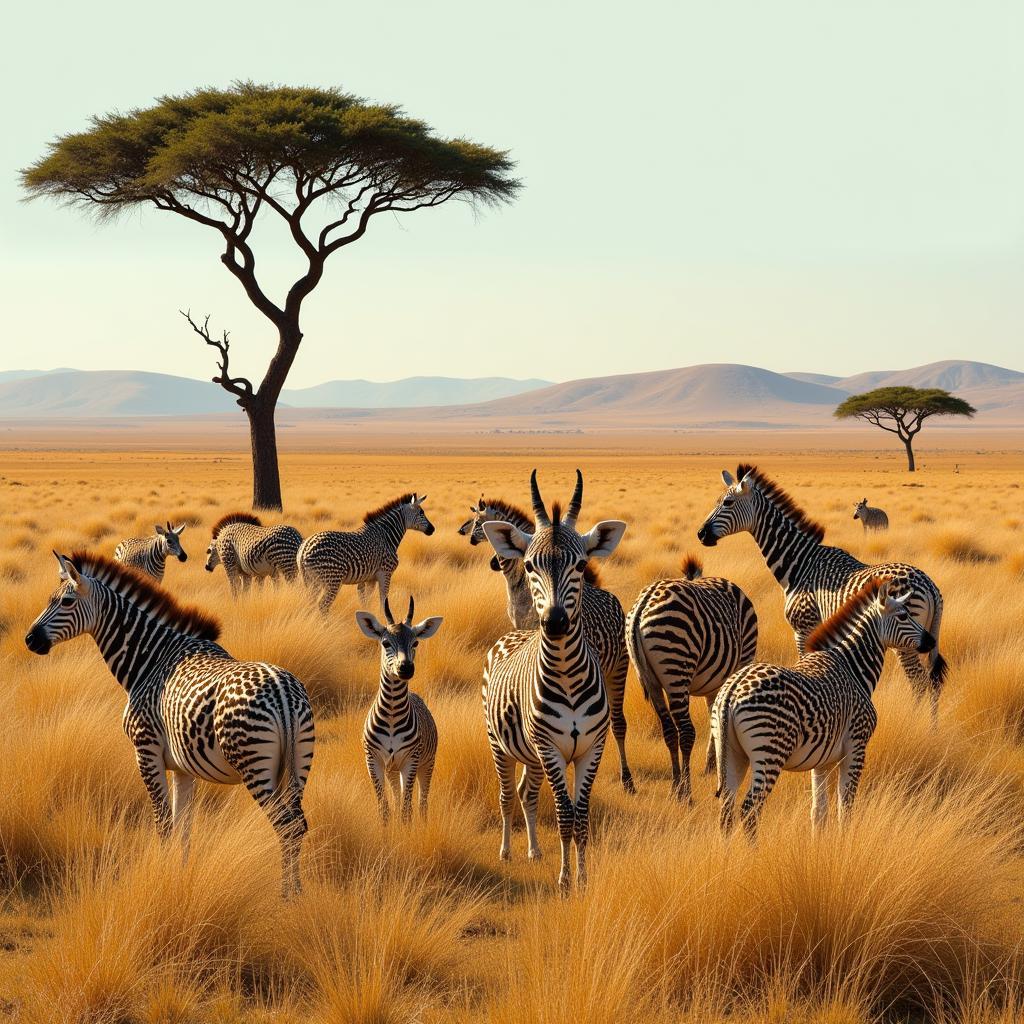The Majestic African Elephant Essay: A Journey into the Heart of the Savanna
The African elephant, the largest land mammal on Earth, holds a place of profound significance within the diverse tapestry of African Life. These magnificent creatures, with their complex social structures and crucial roles in their ecosystems, are a subject of fascination for researchers and nature enthusiasts alike. This African Elephant Essay delves into the world of these gentle giants, exploring their lives, challenges, and the vital role they play in maintaining the delicate balance of the African savanna.
Understanding the African Elephant: Biology and Behavior
African elephants are divided into two subspecies: the savanna elephant and the forest elephant. The savanna elephant, larger of the two, roams the vast grasslands of Africa, while the forest elephant inhabits the dense rainforests of Central and West Africa. Both subspecies exhibit remarkable intelligence, complex social structures, and unique behaviors that have captivated scientists for decades. Their large ears, not just for hearing, also serve as a crucial cooling mechanism in the hot African sun.
These highly intelligent animals communicate through a range of vocalizations, including trumpets, rumbles, and roars, that can travel for miles across the savanna. Their trunks, incredibly versatile and sensitive, are used for everything from picking up blades of grass to showering themselves with dust. Family units, led by matriarchs, form the basis of elephant society, creating strong bonds that last a lifetime.
The Crucial Role of the Elephant in the Ecosystem
African elephants are keystone species, meaning their presence significantly impacts the ecosystem. They create pathways through dense vegetation, allowing smaller animals to navigate the landscape more easily. Their feeding habits, which involve uprooting trees and shrubs, help to shape the savanna and maintain a balance between grassland and woodland.
“Elephants are the architects of the savanna,” explains Dr. Anika Mosi, a renowned wildlife biologist based in Kenya. “Their impact on the landscape is profound, influencing the distribution of plant life and creating habitats for countless other species.”
Threats to the African Elephant: Poaching and Habitat Loss
Despite their size and strength, African elephants face numerous threats, primarily poaching for their ivory tusks and habitat loss due to human encroachment. Poaching has decimated elephant populations in certain regions, pushing them closer to extinction. The illegal wildlife trade poses a significant challenge to conservation efforts, requiring international cooperation and stricter enforcement of laws.
Conservation Efforts: Protecting the Future of the Elephant
Numerous organizations and individuals are working tirelessly to protect African elephants. Conservation efforts focus on anti-poaching patrols, community engagement, and habitat preservation. Creating wildlife corridors that connect fragmented habitats is crucial for ensuring the long-term survival of these magnificent animals.
about african elephant in english
“The future of the African elephant rests on our collective action,” says Dr. Joseph Ngugi, a leading expert in elephant conservation. “By supporting conservation initiatives and raising awareness about the importance of these animals, we can help ensure that they continue to roam the African savanna for generations to come.”
Conclusion: The Future of the African Elephant
The african elephant plays a vital role in the African ecosystem, and its survival is crucial for maintaining the delicate balance of nature. By addressing the threats of poaching and habitat loss, and by supporting ongoing conservation efforts, we can help secure a future for these magnificent creatures. The continued existence of the African elephant is not just an ecological imperative, but also a testament to our commitment to preserving the biodiversity of our planet.
african elephant essay in hindi
FAQ
- What is the difference between a savanna elephant and a forest elephant?
- Why are African elephants considered a keystone species?
- What are the main threats to African elephant populations?
- How can I contribute to African elephant conservation?
- What is the current status of African elephant populations?
- What are some interesting facts about African elephant behavior?
- What are the long-term implications of elephant poaching?
For support, contact Phone: +255768904061, Email: kaka.mag@gmail.com Or visit: Mbarali DC Mawindi, Kangaga, Tanzania. We have a 24/7 customer support team.


